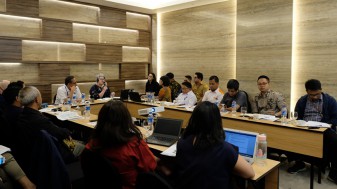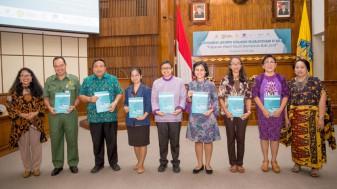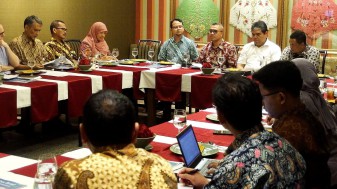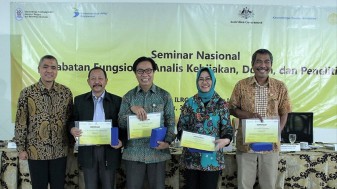In 2007, Atma Jaya Catholic University and the University of Illinois at Chicago (UIC) established a collaborative project with the support of the Global Partnership for Social Sciences AIDS Research – US National Institute of Health (US NIH). The project, originally intended to build research capacity in the field of HIV/AIDS, was the forerunner to the formation of the PUI-PT PPH Center for Excellence in Health Policy and Social Innovation, Atma Jaya Catholic University of Indonesia (PUI-PT PPH PUK2IS UAJ). Three years later, on 10 April 2010, PUI-PT PPH PUK2IS UAJ was officially established, initially named the HIV AIDS Research Center, UNIKA Atma Jaya (PPH UAJ). The establishment of PPH UAJ is a contribution of concerned academics, keen to address the problems of HIV/AIDS, drugs, psychotropic substances and other addictive substances in Indonesia through research, capacity building and community service. In its work program, much of PPH UAJ focus is on policy research and social behavior related to HIV AIDS, sexual and reproductive health, as well as civil society participation in the development of the health sector and HIV programs.
After a decade in existence, 2020 brought an important milestone in the history of PPH UAJ. On 15 July 2020 the Ministry of Education and Culture of the Republic of Indonesia confirmed PPH UAJ as a Center of Excellence of Science and Technology in Higher Education (PUI-PT) with a scientific orientation in the field of social science. Since then, PPH UAJ officially adopted a new name: PUI-PT PPH Center for Excellence in Health Policy and Social Innovation, Atma Jaya Catholic University of Indonesia (PUI-PT PPH PUK2IS UAJ).
To broaden the reach of research in health issues, PUI-PT PPH PUK2IS UAJ expanded in 2019 into the field of mental health. PUI-PT PPH PUK2IS UAJ is currently conducting implementation research on the “Accessibility of Mental Health Services at Puskesmas: Technical Guidelines for Organizing Mental Health Services in General and Pandemic Situations”. This operational policy is aimed at addressing strategies and technical steps that need to be taken by mental health services to increase access to mental health services in a pandemic situation.
Community of Practice Engagement
Indonesia already has a policy umbrella for the implementation of comprehensive, integrated, and sustainable mental health efforts as reflected in Law 18/2014 concerning Mental Health. Puskesmas serves as the primary health service facility in providing mental health services as mandated in Minister of Finance Regulation 4/2019 concerning Technical Standards for Fulfilling Basic Service Quality in the MSS in the Health Sector, and MoF Regulation 39/2016 concerning Guidelines for Implementing a Healthy Indonesia Program with a Family Approach. However, policy gaps remain in the delivery of mental health services at Puskesmas. The main obstacle in service delivery lies in the governance component in the lack of policy support, namely the lack of service delivery guidelines, policies that form the basis of funding, policies that regulate cooperation with stakeholders, policies on community participation, and SOPs for mental health service management.
For this reason, the research conducted by PUI-PT PPH PUK2IS UAJ regarding the accessibility of mental health services at Puskesmas is relevant and important, and even more so during the COVID-19 pandemic which increased the demand for mental health services and disrupted the existing mental health services. Throughout its work in strengthening mental health policy advocacy, PUI-PT PPH PUK2IS UAJ engages the vulnerable community and ensures that they voice their needs, face the challenges, and share the experiences regarding various mental health diagnoses.
In 2019-2020, the first year of research on the accessibility of health services at Puskesmas, PUI-PT PPH PUK2IS UAJ formed a Technical Working Group (TWG) represented by academics, the Ministry of Health (MoH), mental health advocates, and civil society organizations (CSOs). The TWG supported PUI-PT PPH PUK2IS UAJ in conducting field research and provided substantial technical input. Engagement is important to ensure that voices and experiences of various mental health diagnoses are represented and heard, particularly from Local Community Organizations (LCOs) that focus on mental health.
In the second year (2020-2021) of research, PUI-PT PPH PUK2IS UAJ continues to involve the community, initiating a Mental Health Community of Practice (CoP) that includes academics, practitioners, professionals, and mental health advocacy LCOs. The purpose of establishing the CoP is to build a knowledge management platform related to mental health, as well as a place to share knowledge and experiences. In a knowledge management framework, a CoP is needed to support the knowledge sharing process. The success of the CoP is determined by how active its members are. Among the benefits of CoP for its members is the mutual support and strengthening it enables through knowledge sharing; expanding the network through the available platforms to share information, experiences, knowledge and skills; providing a platform for channeling knowledge and research results into practice, implementation, or innovation; promoting learning and learning environments; and supporting self and institutional improvement. It is hoped this will strengthen mental health policy advocacy.
Reflections on Advocacy
Since 2019, PUI-PT PPH PUK2IS UAJ has developed a policy pathway using Program Logic for its work to influence mental health policy. PUI-PT PPH PUK2IS UAJ has conducted two reflection sessions in developing and implementing this Program Logic. These sessions were led by an expert facilitator with the aim of reflecting on what worked, what did not, and what needs strengthening. The Program Logic reflection sessions allowed PUI-PT PPH PUK2IS UAJ to improve its mental health policy advocacy strategy. This was achieved by reducing the policy influence targets from three provinces to only one province, namely DKI Jakarta; reconsidering the sequence of engagement strategies with stakeholders and the mental health community of practice, and strengthening stakeholder mapping to drive the policy process.
With this reflection and, at the beginning of the second year of research following the strengthening of policy mapping, PUI-PT PPH PUK2IS UAJ succeeded in obtaining support from target stakeholders, namely the Director of the Directorate of Prevention and Control of Mental Health and Drug Problems (P2MKJN) of the Ministry of Health. The P2MKJN Directorate issued a recommendation letter which approved the PPH Atma Jaya research. Immediately afterwards, representatives from the Ministry of Health, the Local Government Health Office, the Local Health Sub-Services, and five Puskesmas were selected as active members of the Technical Team to prepare technical guidelines for mental health services in general and pandemic situations.
The participation of these stakeholders shows how the work of PUI-PT PPH PUK2IS UAJ is relevant, timely and useful. Furthermore, the Ministry of Health and the Health Office collaborated with the DKI Jakarta Provincial Cooperation Bureau to meet and prepare a memorandum of understanding on technical guidelines. This memorandum of understanding will enable the implementation of technical guidelines to approximately 40 Puskesmasin DKI Jakarta. Support from the main stakeholders in the form of a recommendation letter and the drafting of a memorandum of understanding showed their intention to follow up on the mental health policies advocated by PUI-PT PPH PUK2IS UAJ. These technical guidelines are projected to be completed by May 2021.
As a form of commitment to mental health advocacy, PUI-PT PPH PUK2IS UAJ has also approached the Presidential Staff Office (KSP). In an audience with KSP in early March 2021, the presentation of PUI-PT PPH PUK2IS UAJ regarding the urgency of mental health advocacy in Indonesia received a positive response from KSP. This is certainly encouraging, because although the KSP was not part of the initial stakeholder mapping, the opportunity to reach them is a significant one. This meeting with KSP is expected to help advance the drafting of derivative regulations of Law 18/2014 concerning Mental Health to strengthen mental health policies in Indonesia. Several follow-up plans that were produced through meetings with the KSP including further discussions to refine problem identification and solutions before cross-sector coordination is carried out; psychoeducation and information through webinars in collaboration with KSP and other ministries; as well as community involvement in providing input on regulations.
Knowledge Sector Initiative (KSI) Support
PUI-PT PPH PUK2IS UAJ uses funds from KSI to conduct implementation research on Accessibility of Mental Health Services in Puskesmas: Technical Guidelines for Organizing Mental Health Services in General and Pandemic Situations. This support from KSI enables PUI-PT PPH PUK2IS UAJ to conduct research that provides an evidence base for advocacy and to meet the costs required in the advocacy process. Through program logic sessions and evaluation and monitoring support, KSI helps PUI-PT PPH PUK2IS UAJ to advocate for policies more systematically. This process also helps PUI-PT PPH PUK2IS UAJ better measure its activities and encourages PUI-PT PPH PUK2IS UAJ to integrate reflective processes into work.






